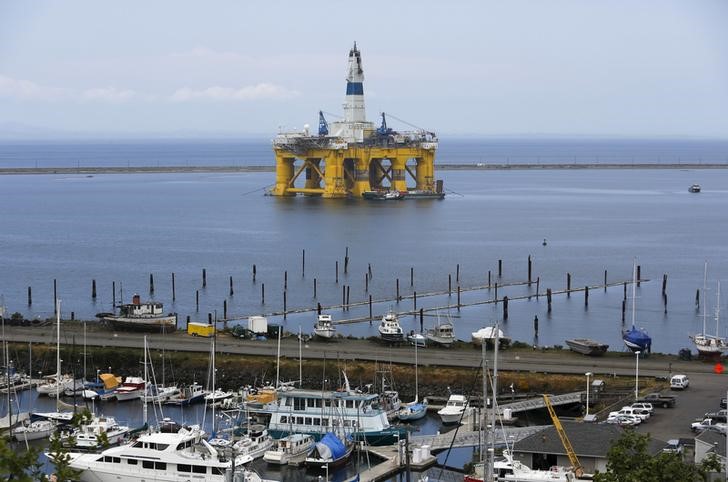TOKYO, July 18 (Reuters) - Oil prices fell on Thursday,
extending declines into a fourth day, after official data showed
U.S. stockpiles of products like gasoline rose sharply last
week, suggesting weak demand during the peak driving season.
Brent crude LCOc1 futures were down 15 cents, or 0.2%, at
$63.51 a barrel by 0044 GMT. They fell 1.1% on Wednesday.
U.S West Texas Intermediate crude CLc1 futures fell 26
cents, or 0.5%, to $56.52. The U.S. benchmark dropped 1.5% in
the previous session.
While data on Wednesday from the U.S. Energy Information
Administration showed a larger-than-expected drawdown in crude
stockpiles last week, traders focussed on large builds in
refined product inventories dragging prices down.
"Oil markets are very heavy under the weight of a
counter-seasonal build in gasoline inventories, which is
typically a harbinger of worse things to come," said Stephen
Innes, managing partner at Vanguard Markets.
"Gasoline consumption is painfully weak given U.S. consumers
are in peak driving season," he said.
U.S. crude inventories USOILC=ECI fell 3.1 million
barrels, the EIA said, more than analysts' forecasts for a
decrease of 2.7 million barrels. However, gasoline stocks USOILG=ECI rose 3.6 million
barrels, compared with analysts' expectations in a Reuters poll
for a 925,000-barrel drop. Distillate stockpiles USOILD=ECI
grew by 5.7 million barrels, much more than expectations for a
613,000-barrel increase, the EIA data showed.
Crude production was disrupted last week by Storm Barry,
which came ashore on Saturday in central Louisiana as a Category
1 hurricane, the first major storm to hit the U.S. Gulf of
Mexico this season.
More than half of daily crude production in the Gulf of
Mexico remained offline by Tuesday, as most oil companies were
re-staffing facilities to resume production.
The market also shrugged of another incident involving a
tanker in the Middle East amid tensions between the United
States and Iran.
U.S. officials say they are unsure whether an oil tanker
towed into Iranian waters was seized by Iran or rescued after
facing mechanical faults as Tehran asserts, creating a mystery
at a time of high tension in the Middle East.
- English (USA)
- English (UK)
- English (India)
- English (Canada)
- English (Australia)
- English (South Africa)
- English (Philippines)
- Deutsch
- Español (España)
- Español (México)
- Français
- Italiano
- Nederlands
- Português (Portugal)
- Polski
- Português (Brasil)
- Русский
- Türkçe
- العربية
- Ελληνικά
- Svenska
- Suomi
- עברית
- 日本語
- 한국어
- 简体中文
- 繁體中文
- Bahasa Indonesia
- Bahasa Melayu
- ไทย
- Tiếng Việt
- हिंदी
Crude futures fall after strong build in U.S. oil products stocks
Published 18/07/2019, 01:58
Crude futures fall after strong build in U.S. oil products stocks

Latest comments
Install Our App
Risk Disclosure: Trading in financial instruments and/or cryptocurrencies involves high risks including the risk of losing some, or all, of your investment amount, and may not be suitable for all investors. Prices of cryptocurrencies are extremely volatile and may be affected by external factors such as financial, regulatory or political events. Trading on margin increases the financial risks.
Before deciding to trade in financial instrument or cryptocurrencies you should be fully informed of the risks and costs associated with trading the financial markets, carefully consider your investment objectives, level of experience, and risk appetite, and seek professional advice where needed.
Fusion Media would like to remind you that the data contained in this website is not necessarily real-time nor accurate. The data and prices on the website are not necessarily provided by any market or exchange, but may be provided by market makers, and so prices may not be accurate and may differ from the actual price at any given market, meaning prices are indicative and not appropriate for trading purposes. Fusion Media and any provider of the data contained in this website will not accept liability for any loss or damage as a result of your trading, or your reliance on the information contained within this website.
It is prohibited to use, store, reproduce, display, modify, transmit or distribute the data contained in this website without the explicit prior written permission of Fusion Media and/or the data provider. All intellectual property rights are reserved by the providers and/or the exchange providing the data contained in this website.
Fusion Media may be compensated by the advertisers that appear on the website, based on your interaction with the advertisements or advertisers
Before deciding to trade in financial instrument or cryptocurrencies you should be fully informed of the risks and costs associated with trading the financial markets, carefully consider your investment objectives, level of experience, and risk appetite, and seek professional advice where needed.
Fusion Media would like to remind you that the data contained in this website is not necessarily real-time nor accurate. The data and prices on the website are not necessarily provided by any market or exchange, but may be provided by market makers, and so prices may not be accurate and may differ from the actual price at any given market, meaning prices are indicative and not appropriate for trading purposes. Fusion Media and any provider of the data contained in this website will not accept liability for any loss or damage as a result of your trading, or your reliance on the information contained within this website.
It is prohibited to use, store, reproduce, display, modify, transmit or distribute the data contained in this website without the explicit prior written permission of Fusion Media and/or the data provider. All intellectual property rights are reserved by the providers and/or the exchange providing the data contained in this website.
Fusion Media may be compensated by the advertisers that appear on the website, based on your interaction with the advertisements or advertisers
© 2007-2025 - Fusion Media Limited. All Rights Reserved.